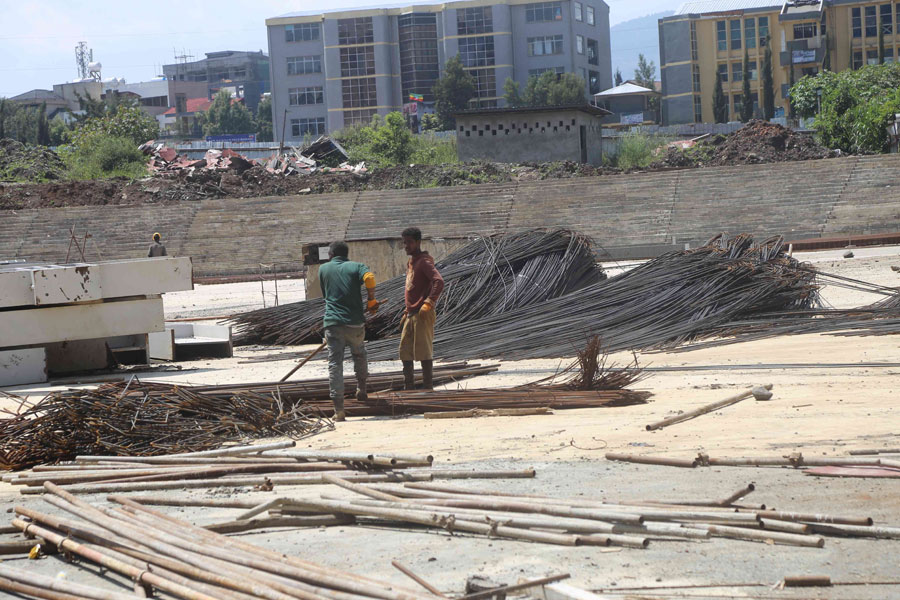
Editorial | Apr 20, 2025
Mar 26 , 2022
By Tigist Solomon
There are both biological and gender differences between a man and a woman. For sociologists and anthropologists, socialisation and cultural values determine gender differences. In most developed societies, parents initiate gender differences by offering dolls to girls and toys or video game consoles to boys. In most rural areas of Ethiopia, girls and boys are used to seeing their mothers and older sisters responsible for household chores while their fathers and older brothers mainly take care of outdoor activities.
As such, the gender roles assigned to women and men are accepted norms by society. Men are often assigned to outdoor activities in most traditional societies while women are unpaid housekeepers and caretakers. Women, including girls, are responsible for cooking, cleaning, childcare, fetching water, collecting firewood and selling at the market.
Men focus instead on outdoor activities such as agricultural work. Society in most rural areas perceives men as the sole breadwinners in the family while women are considered spendthrifts. Usually, housewives use money given by breadwinners (husbands) to buy food to prepare meals for the family. The activities attributed to women in the home have less value and prestige and do not involve any remuneration.
Nevertheless, household chores are recognised as employment and generate income for rural females who migrate to neighbouring towns and cities. The first paid job of female urban migrants is primarily domestic work. The specific gender roles assigned to women and girls in rural areas generate income in the city with more training and good experience in domestic work. By working as domestics, female migrants earn an income to support themselves and their families back home. International migration for domestic work in the Middle East is also widespread among rural women in Ethiopia. Instead, rural men are encouraged to stay in their homeland with opportunities for agricultural work and land inheritance. There are indeed few paid jobs available to them abroad for the skills they acquire.
Nevertheless, the working conditions of domestic workers are hazardous and require long working hours in exchange for low pay.
Research in three major cities in Ethiopia indicated that 49pc of female domestic workers never had the chance of going to school compared to 13pc of non-domestic workers. The same research disclosed that female domestic workers are at risk for sexual abuse and non-consensual sex that are rarely reported for fear of losing jobs or accommodations with those residing in the household.
Domestic work in Ethiopia is known for being an exploitative profession with long working hours for little or no pay. They earn lesser than other workers. Studies on domestic work in Ethiopia revealed that the profession is not regulated by labour laws and the country has not ratified International Labour Organisation’s (ILO) Domestic Workers Convention (C189) which appeals for standards such as minimum wages and working hours and protections from all forms of abuse, harassment and violence. Ratifying the convention as well as setting proclamations to regulate the working conditions of domestic workers are needed. Likewise, those migrating to the Middle East need the support necessary for their protection.
Although women's roles, such as unpaid housework, are gaining value and acceptance as a formal form of employment and income-generating activity, more and more advocacy is needed to protect the welfare and rights of female workers. Current efforts by government and non-profit organisations to promote the protection of domestic workers in Ethiopia are encouraging and need to be further strengthened. The added value to unpaid female housework through paid domestic work contributes to the effort in promoting gender equality in the country.
PUBLISHED ON
Mar 26,2022 [ VOL
22 , NO
1143]


Editorial | Apr 20, 2025

Fortune News | Oct 07,2023

Fortune News | Jun 06,2023

Radar | May 25,2019

Commentaries | Mar 09,2024

Fortune News | Jun 21,2025

Fortune News | Apr 08,2023

View From Arada | Dec 07,2019

Commentaries | Oct 26,2024

Sunday with Eden | Feb 11,2023

Photo Gallery | 174901 Views | May 06,2019

Photo Gallery | 165125 Views | Apr 26,2019

Photo Gallery | 155388 Views | Oct 06,2021

My Opinion | 136739 Views | Aug 14,2021

Dec 22 , 2024 . By TIZITA SHEWAFERAW
Charged with transforming colossal state-owned enterprises into modern and competitiv...

Aug 18 , 2024 . By AKSAH ITALO
Although predictable Yonas Zerihun's job in the ride-hailing service is not immune to...

Jul 28 , 2024 . By TIZITA SHEWAFERAW
Unhabitual, perhaps too many, Samuel Gebreyohannes, 38, used to occasionally enjoy a couple of beers at breakfast. However, he recently swit...

Jul 13 , 2024 . By AKSAH ITALO
Investors who rely on tractors, trucks, and field vehicles for commuting, transporting commodities, and f...

Oct 18 , 2025
The political establishment, notably the ruling party and its top brass, has become p...

Oct 11 , 2025
Ladislas Farago, a roving Associated Press (AP) correspondent, arrived in Ethiopia in...

Oct 4 , 2025
Eyob Tekalegn (PhD) had been in the Governor's chair for only weeks when, on Septembe...

Sep 27 , 2025
Four years into an experiment with “shock therapy” in education, the national moo...

Oct 18 , 2025 . By NAHOM AYELE
In a sweeping reform that upends nearly a decade of uniform health insurance contribu...

Oct 18 , 2025 . By BEZAWIT HULUAGER
A bill that could transform the nutritional state sits in a limbo, even as the countr...

Oct 18 , 2025 . By SURAFEL MULUGETA
A long-planned directive to curb carbon emissions from fossil-fuel-powered vehicles h...

Oct 18 , 2025 . By BEZAWIT HULUAGER
Transaction advisors working with companies that hold over a quarter of a billion Bir...